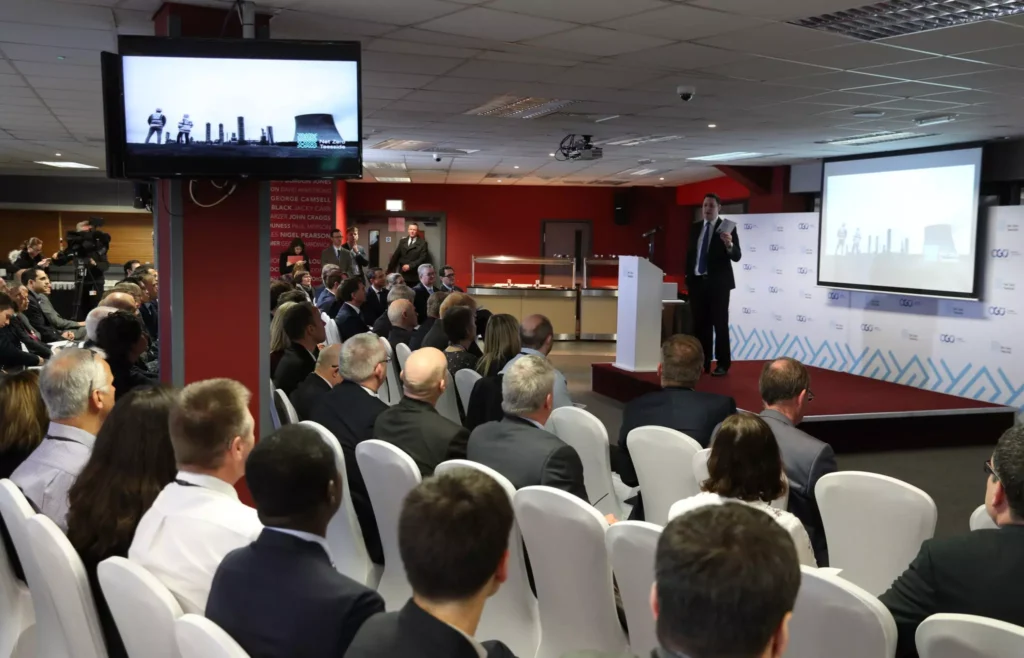Last month saw the official launch event of the Net Zero Teesside (NZT) CCUS project in the North East of England. The event brought together an audience of MPs, policy makers, business leaders and local stakeholders to hear from speakers, including Climate Investments CEO Pratima Rangarajan, about the significant role the project will play in helping the United Kingdom to reach its net zero 2050 greenhouse gas emissions target.
The launch event, held in Middlesbrough’s Riverside Stadium under the shadow of the iconic Tees Transporter Bridge, provided the platform to announce the formation of a consortium of OGCI members – BP, Eni, Equinor, Shell and Total, with BP as operator – to take over ownership of the project and accelerate its development to deliver the UK’s first zero carbon cluster by the mid-2020s.

Photo of Andy Lane, the Managing Director for Net Zero Teesside during the launch event.
Kicking off proceedings, BP’s Andy Lane, the Managing Director for Net Zero Teesside, outlined the ambition of the project – to capture up to 6 million metric tons of carbon dioxide emissions each year from a cluster of industrial emitters and transport it for secure storage deep under the North Sea – before introducing Ben Houchen, Tees Valley Mayor on stage.
Mr Houchen spoke of how Net Zero Teesside represents the next step in his ambition for the Teesside region to become a pioneer in clean energy, delivering almost half a billion pounds into the regional economy and helping to safeguard and create 5,500 jobs for local people. The project, Houchen contended, could act as “a beacon for new technologies and further investment as other companies are attracted to the area”.
Simon Clarke MP, the member of parliament for Middlesbrough South and East Cleveland, and Minister for Regional Growth and Local Government, then outlined his vision for how carbon capture technology and Net Zero Teesside could deliver clean growth to the north of England and help the UK as a whole meet its net zero emissions by 2050 target. The UK’s government’s climate adviser, the Committee on Climate Change, argues that the target is impossible to achieve without carbon capture.[1]
When OGCI Climate Investments’ Pratima Rangarajan addressed the audience, she spoke of the project’s “graduation party” as it passes from Climate Investments to the consortium of OGCI member companies. As Dr. Rangarajan recalled, Net Zero Teesside, then known as the Clean Gas Project, was OGCI Climate Investments’ first investment when the fund launched in 2017 and has since become the first project in OGCI’s CCUS Kickstarter initiative, which aims to replicate the success of Net Zero Teesside and unlock large-scale investment in CCUS at an international level. This transfer of ownership to the OGCI consortium is proof of how the Kickstarter initiative is successfully supporting emerging hubs.
Andy Lane returned to the stage to wrap up the event and thanked the project’s partners, including the Tees Valley Mayor and local government, local industry partners, and the local community for their support in developing Net Zero Teesside as the ideal location for the UK’s first CCUS cluster. Mr Lane cited Teesside’s proud industrial heritage as the driving force behind early steelmaking in Britain, and why, with the backing of the powerful partnership led by BP, the region could once again be at the forefront of an exciting new era of clean industry.
As Pratima Rangarajan alluded to, the event and the formal transfer of operatorship to the OGCI consortium is a big step towards making the Net Zero Teesside a reality. But the work does not stop there. With an ambitious yet achievable potential start-up date of the mid-2020s, the project will need to accelerate its development if it is to deliver the UK’s first zero carbon industrial cluster. Fortunately, the consortium partners bring global experience of CCUS technology and are committed to working closely with the UK government and local stakeholders to achieve this.
Since the launch event, the UK Government has announced a new CCS Infrastructure Fund of at least £800 million, which will help establish CCS in at least two UK sites, as well as the commitment to support at least one CCS power station by 2030. The announcement reflects the committment to use CCS to decarbonize heavy industry and power to achieve net zero targets and the ambitions of the Paris Agreement. The Net Zero Teesside team will continue working with its partners and government to make this ambition a reality.
ABOUT OGCI:
The Oil and Gas Climate Initiative is a CEO-led consortium that aims to accelerate the industry response to climate change. OGCI member companies explicitly support the Paris Agreement and its aims. As leaders in the industry, accounting for over 30% of global operated oil and gas production, we aim to play an active role in shaping the global pathway to net zero emissions. We do this by leveraging the collective strengths of OGCI, continually improving, and building on good international corporate practices to reduce greenhouse gas emissions and accelerate transitions to a low-carbon future. OGCI member companies include BP, Chevron, CNPC, Eni, Equinor, ExxonMobil, Occidental, Petrobras, Repsol, Saudi Aramco, Shell and Total.



